Advertisements
Online Mock Tests
Chapters
2: Nutrition in Animals
3: Heat
4: Acids, Bases and Salts
5: Physical and Chemical Changes
6: Respiration in Organisms
7: Transportation in Animals and Plants
8: Reproduction in Plants
9: Motion and Time
▶ 10: Electric Current and Its Effects
11: Light
12: Forests: Our Lifeline
13: Wastewater Story
![NCERT solutions for Science [English] Class 7 chapter 10 - Electric Current and Its Effects NCERT solutions for Science [English] Class 7 chapter 10 - Electric Current and Its Effects - Shaalaa.com](/images/science-english-class-7_6:325736d0fe154a27901a6745284d30d9.jpg)
Advertisements
Solutions for Chapter 10: Electric Current and Its Effects
Below listed, you can find solutions for Chapter 10 of CBSE NCERT for Science [English] Class 7.
NCERT solutions for Science [English] Class 7 10 Electric Current and Its Effects Exercises [Pages 119 - 121]
Draw in your notebook the symbols to represent the following components of electrical circuits: connecting wires, switch in the ‘OFF’ position, bulb, cell, switch in the ‘ON’ position, and battery.
Draw the circuit diagram to represent the circuit shown in the figure.

Figure shows four cells fixed on a board. Draw lines to indicate how you will connect their terminals with wires to make a battery of four cells.
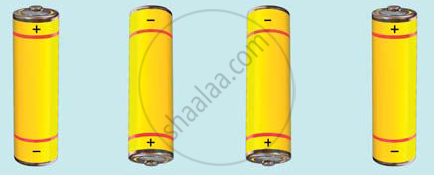
The bulb in the circuit shown in Figure does not glow. Can you identify the problem? Make necessary changes in the circuit to make the bulb glow.
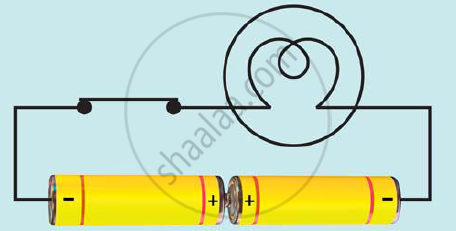
Name any two effects of electric current.
When the current is switched on through a wire, a compass needle kept nearby gets deflected from its north-south position. Explain.
Will the compass needle show deflection when the switch in the circuit shown by figure is closed?

Fill in the blanks:
Longer line in the symbol for cell represents its ______ terminal.
The combination of two or more cells is called a ______.
When current is switched ‘on’ in a room heater, it ______.
The safety device based on the heating effect of electric current is called a ______.
Choose the true and false statements from the following statements:
To make a battery of two cells, the negative terminal of one cell is connected to the negative terminal of the other cell.
True
False
When the electric current through the fuse exceeds a certain limit, the fuse wire melts and breaks.
True
False
An electromagnet does not attract a piece of iron.
True
False
An electric bell has an electromagnet.
True
False
Do you think an electromagnet can be used for separating plastic bags from a garbage heap? Explain.
An electrician is carrying out some repairs in your house. He wants to replace a fuse by a piece of wire. Would you agree? Give reasons for your response.
Zubeda made an electric circuit using a cell holder shown in Figure, a switch and a bulb. When she put the switch in the ‘ON’ position, the bulb did not glow. Help Zubeda in identifying the possible defects in the circuit.
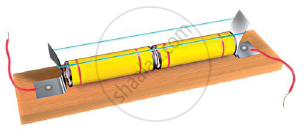
In the circuit shown in figure would any of the bulbs glow when the switch is in the ‘OFF’ position?

In the circuit shown in figure, what will be the order in which the bulbs A, B and C will glow when the switch is moved to the ‘ON’ position?

NCERT solutions for Science [English] Class 7 10 Electric Current and Its Effects Activities and Projects [Pages 121 - 122]
Extended Learning — Activities and Projects
Set up the circuit shown in Figure again. Move the key to ‘ON’ position and watch carefully in which direction the compass needle gets deflected. Switch ‘OFF’ the current. Now keeping rest of the circuit intact, reverse the connections at the terminal of the cell. Again switch ‘on’ the current. Note the direction in which the needle gets deflected. Think of an explanation.
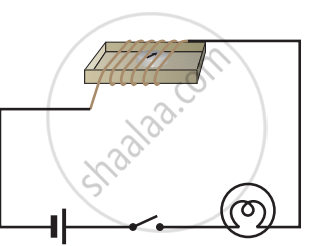
Make four electromagnets with 20, 40, 60 and 80 turns. Connect them one by one to a battery of 2 cells. Bring the electromagnet near a box of pins. Count the number of pins attracted by it. Compare the strengths of the electromagnets.
Using an electromagnet, you can make a working model of a railway signal as shown in figure.
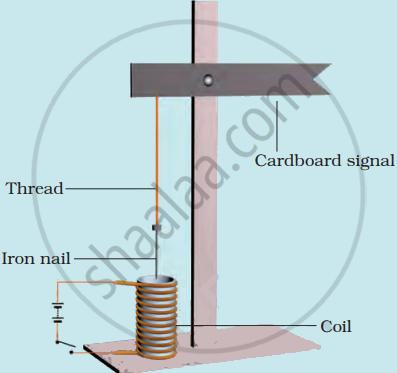
Visit an electric shop. Request an electrician to show you the various types of fuses and MCB and to explain how they work.
Solutions for 10: Electric Current and Its Effects
![NCERT solutions for Science [English] Class 7 chapter 10 - Electric Current and Its Effects NCERT solutions for Science [English] Class 7 chapter 10 - Electric Current and Its Effects - Shaalaa.com](/images/science-english-class-7_6:325736d0fe154a27901a6745284d30d9.jpg)
NCERT solutions for Science [English] Class 7 chapter 10 - Electric Current and Its Effects
Shaalaa.com has the CBSE Mathematics Science [English] Class 7 CBSE solutions in a manner that help students grasp basic concepts better and faster. The detailed, step-by-step solutions will help you understand the concepts better and clarify any confusion. NCERT solutions for Mathematics Science [English] Class 7 CBSE 10 (Electric Current and Its Effects) include all questions with answers and detailed explanations. This will clear students' doubts about questions and improve their application skills while preparing for board exams.
Further, we at Shaalaa.com provide such solutions so students can prepare for written exams. NCERT textbook solutions can be a core help for self-study and provide excellent self-help guidance for students.
Concepts covered in Science [English] Class 7 chapter 10 Electric Current and Its Effects are Symbols and Functions of Various Components of an Electric Circuits, Heating Effect of Electric Current, Magnetic Effect of Electric Current, Electricity, Electric Circuit, Battery, Symbols and Functions of Various Components of an Electric Circuits, Heating Effect of Electric Current, Magnetic Effect of Electric Current, Electricity, Electric Circuit, Battery.
Using NCERT Science [English] Class 7 solutions Electric Current and Its Effects exercise by students is an easy way to prepare for the exams, as they involve solutions arranged chapter-wise and also page-wise. The questions involved in NCERT Solutions are essential questions that can be asked in the final exam. Maximum CBSE Science [English] Class 7 students prefer NCERT Textbook Solutions to score more in exams.
Get the free view of Chapter 10, Electric Current and Its Effects Science [English] Class 7 additional questions for Mathematics Science [English] Class 7 CBSE, and you can use Shaalaa.com to keep it handy for your exam preparation.
